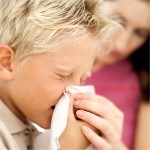Know About Child Allergy
Nature has made us in a stunning way. A baby who is just yet born has full capability of identifying between harmful and beneficial foreign bodies. The immune system of a baby is such developed as to fight with the harmful agents that enter the body. However, there are certain substances, which are okay for the adults but may prove to be toxic or allergic for babies.
Types of allergens
Substances that cause allergy are classified into three broad categories. That can be foods, inhalants or environmental pollutions. Dairy products, tree nuts, soy, corn, shellfish etc. are the allergens of the food category. Dust mites, pollens, grain dust etc. belong to the inhalant category. Certain chemicals present in petrochemicals, paints, smoke, soap etc. fall in the environmental pollutants category.
Effect of allergens in children ?
 The newborn’s body may develop infant rashes or bumps. If the infant has come in contact with an allergen, the raised bumps will be present in the area of contact only. On the other hand, if the allergen is present in the food, these bumps may appear at various parts of the body including stomach, hands, face, back, etc. Hives of these bumps indicate some kind of allergy whereas tiny bumps correspond to yeast infections. Many common type of allergies causes baby skin rashes.
The newborn’s body may develop infant rashes or bumps. If the infant has come in contact with an allergen, the raised bumps will be present in the area of contact only. On the other hand, if the allergen is present in the food, these bumps may appear at various parts of the body including stomach, hands, face, back, etc. Hives of these bumps indicate some kind of allergy whereas tiny bumps correspond to yeast infections. Many common type of allergies causes baby skin rashes.
The infant may cry excessively or may roll his body or try to scratch the irritated parts depending on his age and mobility level. If your child suffers from eczema, it is also an indication of some kind of allergy. The skin becomes dry and scaly, especially at the back of the ears and on the scalp. The child’s eyes, face or lips may become swollen and there may be some kind of difficulty in breathing because of swollen throat. It can be lethal also as the swelling of the throat may altogether stop the breathing process.
Other less common effects
Some children may suffer from a running nose or weeping eyes. Some children who have some kind of sinus problem may develop cough. These allergic reactions can even affect infants who are still on breast-feeding. It is because something in the mother’s diet is causing allergy to them. Most probably, they are not finding the bovine dairy products that are eaten by their mother conducive to their bodies.
Such an infant can have swollen stomach, may suffer from chronic gas problem, frequent vomiting and excessive crying. The stools may be watery and of a color that is not common in baby stools. The baby may also suffer form constipation and may cry while passing urine or while emptying the bowels. Often these symptoms are misjudged as colicky symptoms. In addition to the above symptoms, a child may sleep longer or may sleep very little. Such a child needs continuous attention from his parents and is unable to be quiet on his own. The child may also mistake the pain of flatulence for hunger and thus may eat a lot. On the contrary, the child may also stop eating altogether.
As most of the symptoms are contradictory, it takes extremely vigilant parents and the counseling of a specialist to win over allergies in infants